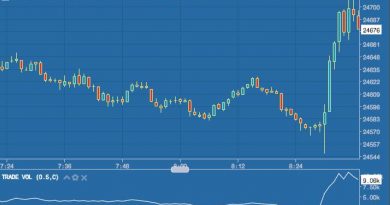Trade-Through Meaning Exceptions To Regulations Example

Trade-Through: Meaning, Exceptions To Regulations, Example
What Is a Trade-Through?
A trade-through is an order executed at a suboptimal price despite a better price being available on the same exchange or another exchange.
Regulations to protect against trade-throughs were first passed in the 1970s and were improved upon in Rule 611 of Regulation NMS in 2007.
Key Takeaways
-A trade-through occurs when an order is executed at a worse price than the best price available, bypassing the better market price.
-Trade-throughs shouldn’t occur in typical market conditions since, by regulation, orders must be routed to the best price.
-Trade-through rules don’t apply to manual quotes (only electronic ones), and the one-second rule provides leeway in fast-moving markets.
Understanding Trade-Throughs
Trade-throughs are illegal, as regulations require orders to be executed at the best available price. If a better price is quoted elsewhere, the trade must be routed there for execution, rather than "traded through" at a worse price.
Rule 611 of Regulation NMS, also known as the Order Protection Rule, aims to ensure both institutional and retail investors get the best possible price for a given trade, by comparing quotes on multiple exchanges. These regulations extend the old trade-through provisions from the NYSE to all NASDAQ and AMEX-listed stocks, as well as many smaller exchanges.
The current Order Protection Rule also protects share blocks of less than 100 shares, which in the past could be traded by brokerages without penalty. These regulations have helped smaller retail investors avoid unfair price execution and compete on level playing fields with larger institutional investors that purchase stock in large blocks.
Trade-throughs typically should not occur on U.S. stock markets.
Exceptions to Trade-Through Regulations
Trade-throughs are defined as the purchase or sale of a stock listed on an exchange with consolidated market data disseminated at a price lower than a protected bid or higher than a protected offer. While Regulation NMS broadly applies to all types of venues executing trades in modern equity markets, including registered exchanges, alternative trading systems (ATSs), off-exchange market makers, and other broker-dealers, there are instances where trade-through regulations may not apply.
Manual quotes are not protected by Regulation NMS, as consolidated market data is not disseminated electronically. The new regulations only apply to electronically-delivered price quotes, which must be posted across all exchanges subject to Regulation NMS.
Another exception is the "one-second window," designed to prevent intramarket trade-throughs during fast-moving markets when quotes rapidly change. If a trade is executed at a price that would not have been a trade-through within the previous one second, it is exempted from trade-through regulations.
Example of a Trade-Through Occurring in a Stock
Assume an investor wants to sell 200 Berkshire Hathaway Class B (BRK.B) shares. The stock has 500 shares bid at $204.85 and another 300 shares bid at $204.80.
The highest bid is currently $204.85 with 500 shares, so if our investor sells, the order should execute at that price assuming the price and shares don’t change before the sell order reaches the exchange.
The sell order for 200 shares should fill at $204.85, leaving 300 shares on the bid at that price.
A trade-through would occur if the order was executed at $204.80 or a price lower than $204.85, despite shares being available at a better price ($204.85) to fill the sell order.
Similarly, assume an investor wants to buy 100 shares of BRK.B. There are currently 1,000 shares offered at $204.95. Since there are more than enough shares offered at $204.95 to fill the buy order, the investor should get their shares at $204.95. A trade-through occurs if the buyer ends up paying a higher price, like $205, even though there are shares listed at the better price of $204.95.



